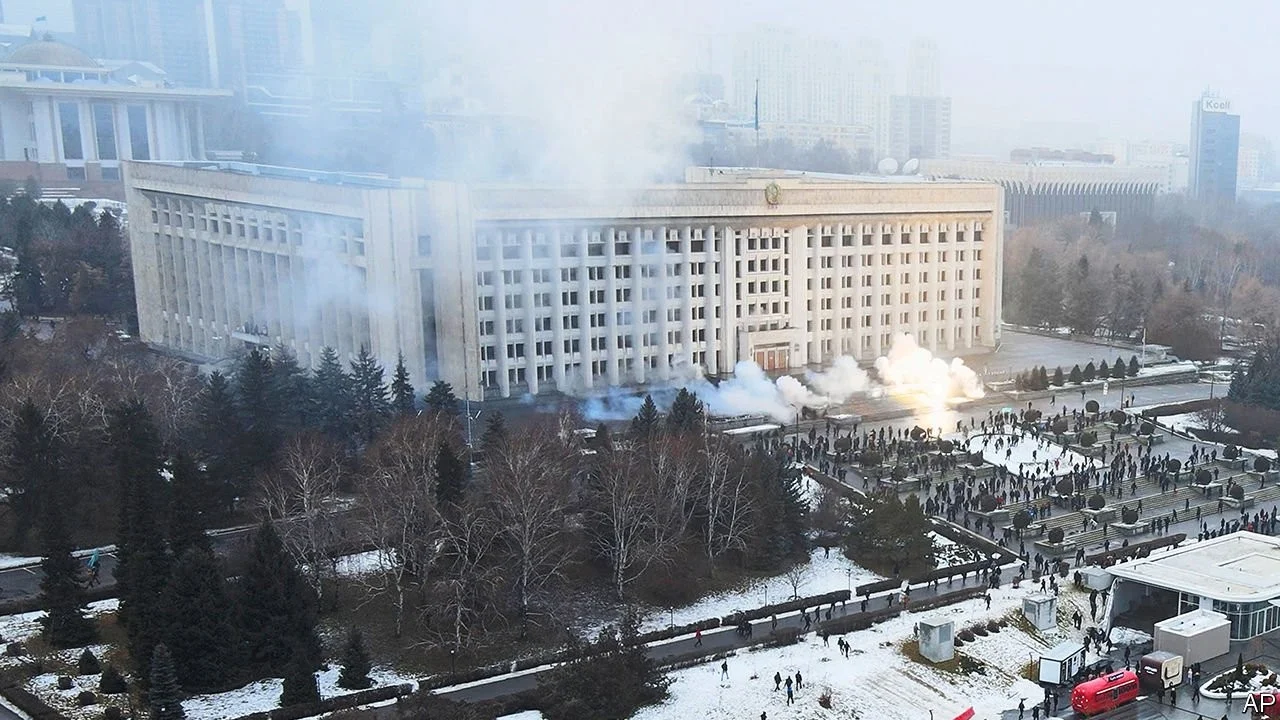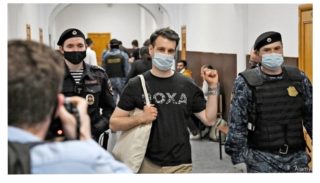WHEN KAZAKHSTAN’S government resolved to end subsidies on liquefied petroleum gas (LPG) three years ago, the decision attracted little attention. The country’s leaders could not have guessed that the move would threaten the very existence of the regime that has ruled the Central Asian country since it became an independent republic in 1991.
Price controls had to go, officials explained at the time, to stimulate investment in a sector plagued with inefficiencies. Fuel producers had little incentive to increase supply when the system meant they ended up selling it at a loss. On January 1st fuel prices became fully market-based. The cost of LPG, which many Kazakhs use instead of petrol or diesel to run their cars, soon shot up, doubling in some places from 60 tenge ($0.14) a litre at the end of last year to 120 tenge by January 2nd.
Protests immediately broke out in Zhanaozen, a depressed town in the oil-rich western part of Kazakhstan. It did not take long for them to spread around the vast country, snowballing from a specific grievance about fuel prices into demands for regime change. By January 5th protesters were storming buildings in Almaty, the largest city, and briefly occupied its airport. The president sacked his prime minister and declared a state of emergency.
Big protests are rare in Kazakhstan, which has a reputation for stability in a volatile region, mostly because the country’s authoritarian rulers crack down harshly on public displays of disaffection. So it was all the more surprising when, on January 3rd, demonstrators in northern Nur-Sultan, the capital, Almaty, the financial centre in the south, and other towns came out in solidarity with their brethren in Zhanaozen, who complain that the country’s vast oil wealth has done little to improve their living standards. This quickly turned into fury over wider economic grievances, including rising inflation and unemployment, and then to shouts of “shal ket!”, or “old man out!”
The “old man” is Nursultan Nazarbayev, the octogenarian former president who steered Kazakhstan to independence when the Soviet Union collapsed and now occupies the role of elder statesman. He rules in tandem with his handpicked successor, Kassym-Zhomart Tokayev. Some protesters want Mr Nazarbayev to be stripped of his status as Leader of the Nation, which affords him broad powers and privileges, including immunity from prosecution.
It does not help that the most visible symbol of the ruling elites’ arrogance—the glittering new capital of Nur-Sultan—is named after the former president himself. There have long been quiet grumblings about Mr Nazarbayev’s relatives and cronies enriching themselves with proceeds from the country’s natural resources while citizens struggle with a high cost of living and meagre wages. The average salary is less than $7,000 a year. Despite promises of diversification, the economy relies heavily on natural resources. Those grumblings have now burst out into the open.
And take your cronies with you
“Old man out” has taken on a broader meaning, too, targeting not just Mr Nazarbayev but the entire political establishment. Mr Tokayev, who on becoming president in 2019 promised to create what he called a “listening state”, complete with democratic reform and political competition, has failed to deliver change. Stringent restrictions on civil liberties remain, and there are no opposition parties. Protesters have called for the rubber-stamp parliament to be prorogued and for urban and provincial leaders, who are currently appointed, to be elected.
The regime’s first response was to reach for the carrot. On January 4th it promised to cut the price of fuel to below its pre-protest level. The president also ordered officials to regulate prices for six months, in effect reintroducing subsidies. The cabinet was dismissed, in line with demonstrators’ demands. Yet that seemed only to embolden the protesters. Using makeshift weapons, they battled police overnight, injuring around 100, stormed Almaty’s city hall (pictured) and torched other official buildings in several cities and toppled a statue of Mr Nazarbayev in one town.
Next, the stick. Hundreds of people have been arrested. On January 5th Mr Tokayev introduced a state of emergency in some places, extending it nationwide the next day. Internet disruptions have been reported across the country. The president warned Kazakhs not to “follow the calls of destructive forces”, hinting at Mukhtar Ablyazov, an opposition figure based in France who has tried to hijack the rallies and depict himself as a leader of the nascent movement.
The Kremlin is watching with concern, too. Commentators loyal to President Vladimir Putin have suggested that the West is trying to foment a colour revolution in Kazakhstan. The aim of this imaginary plot is supposedly to destabilise Russia as it prepares to talk to NATO about its threats to invade Ukraine. Late on January 5th, the Collective Security Treaty Organisation, a military alliance of six post-Soviet states, dominated by Russia, said it would send peacekeeping forces to intervene—the first time the group has done so since its formation in 1994.
Mr Tokayev has so far blamed internal provocateurs, outside forces, his own government and oil companies for the unrest. In a televised address on January 5th intended to convey resolve he said he would act “robustly” and reassured citizens that “whatever happens, I will remain in the capital”. It is unclear whether that is what his country’s citizens want to hear. Mr Tokayev’s “listening state” has turned out to be tone deaf.
By The Economist





